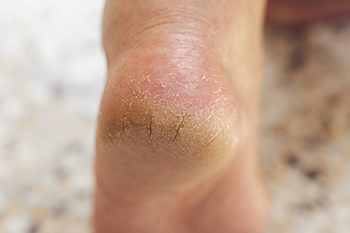
Cracked heels, a common foot woe, often result from a combination of environmental, lifestyle, and health factors. Dry skin, exacerbated by insufficient hydration, is a leading culprit, and exposure to harsh weather conditions, such as cold or dry air, can strip the skin of its natural moisture. Prolonged standing or walking on hard surfaces may contribute to pressure on the feet, leading to calluses and eventual cracking. Inadequate foot care, including infrequent moisturizing and neglecting proper exfoliation, can make the problem worse. Additionally, conditions such as obesity and diabetes may compromise skin health, increasing vulnerability to cracked heels. Footwear choices also play a role, as open-back shoes or sandals expose the heels to friction and dryness. Recognizing and addressing these underlying causes is essential for effective management. If you have developed cracked heels, it is strongly suggested that you visit a podiatrist who can effectively treat this condition, which may include prescribed medication.
Cracked heels are unsightly and can cause further damage to your shoes and feet. If you have any concerns, contact Dr. Odin De Los Reyes from Connecticut. Our doctor can provide the care you need to keep you pain-free and on your feet.
Cracked Heels
Cracked heels appear unappealing and can make it harder for you walk around in sandals. Aside from looking unpleasant, cracked heels can also tear stockings, socks, and wear out your shoes. There are several methods to help restore a cracked heel and prevent further damage.
How Do You Get Them?
Dry skin is the number one culprit in creating cracked heels. Many athletes, walkers, joggers, and even swimmers suffer from cracked heels. Age and skin oil production play a role to getting cracked heels as well.
Promote Healing
Over the counter medicines can help, especially for those that need instant relief or who suffer from chronic dry feet.
Wear Socks – Wearing socks with medicated creams helps lock in moisture.
Moisturizers – Applying both day and night will help alleviate dryness which causes cracking.
Pumice Stones – These exfoliate and remove dead skin, which allows for smoother moisturizer application and better absorption into the skin.
Change in Diet
Eating healthy with a well-balanced diet will give the skin a fresh and radiant look. Your body responds to the kinds of food you ingest. Omega-3 fatty acids and zinc supplements can also revitalize skin tissue.
Most importantly, seek professional help if unsure how to proceed in treating cracked heels. A podiatrist will help you with any questions or information needed.
If you have any questions, please feel free to contact our offices located in Southbury and Farmington, CT . We offer the newest diagnostic and treatment technologies for all your foot care needs.
